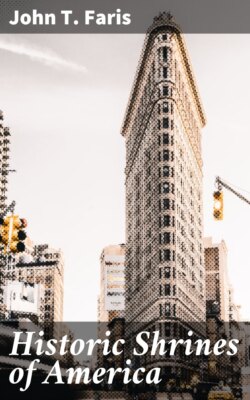Читать книгу Historic Shrines of America - John T. Faris - Страница 15
На сайте Литреса книга снята с продажи.
Оглавление"Then the great scales were brought, amid laughter and jest,
And Betsy was called to step in and be weighed;
But a silence fell over each wondering guest
When the mint-master opened a ponderous chest
And a fortune of shillings displayed.
"By handfuls the silver was poured in one side
Till it weighed from the floor blushing Betsy, the bride;
And the mint-master called: 'Prithee, Sewell, my son,
The horses are saddled, the wedding is done;
Behold the bride's portion; and know all your days
Your wife is well worth every shilling she weighs.'"
Edmund Quincy married at twenty-one, and became the next occupant of the mansion. During his long life there were welcomed to the hospitable roof many of those whose words and deeds prepared the way for the liberty that was to come to the country within a century.
The second of the Quincy line was a leader in the town. At one time he was its representative in the General Court, and as colonel of the Suffolk Regiment, he was the first of a long list of colonels in the family. But the day came when it was written of him, "Unkel Quincy grows exceeding crazy," and in 1698 the second Edmund yielded the house to Edmund the third.
This Edmund also became a colonel and a representative and, later, a judge of the Supreme Court. His pastor said of him, "This great man was of a manly Stature and Aspect, of a Strong Constitution and of Good Courage, fitted for any Business of Life, to serve God, his King and Country." Not only did he enlarge the glory of the family, but, in 1706, he enlarged the house, yet in such a way that the original Coddington house could be clearly traced after the improvements were finished. Judge Sewell, the cousin of the builder, was one of the welcome occupants of the improved house. On his way to Plymouth he stopped at "Braintry." "I turned in to Cousin Quinsey," he said, "where I had the pleasure to see God in his Providence shining again upon the Persons and Affairs of the Family after long distressing Sickness and Losses. Lodged in the chamber next the Brooke." Later on another chamber near the brook was provided for Mrs. Quincy's brother, Tutor Flynt of Harvard, when he came that way for rest and change.
The oldest child of this generation was Edmund, whose daughter, Dorothy Quincy, married John Hancock, while the fourth child was Dorothy Quincy, the great-grandmother of Oliver Wendell Holmes.
The continuity of life at the mansion was sadly broken when, within a year, the grandmother, the mother, and the father died. The death of the latter occurred in England, where he had gone on business for the colony. When news came of the ending of his life, the General Court of Massachusetts declared that "he departed the delight of his own people, but of none more than the Senate, who, as a testimony of their love and gratitude, have ordered this epitaph to be inscribed on his tomb in Bunhill Fields, London."
For a year Dorothy Quincy remained in the house; but on her marriage the place ceased for a time to be the chief residence of a Quincy. Edmund was in business in Boston. He resorted to the house for a season now and then, but his Boston home remained his permanent abiding place until after the birth of his daughter Dorothy. Then failing fortune sent him back to the ancestral home.
During the next few years John Adams, Benjamin Franklin, and John Hancock were favored visitors at the mansion. John Hancock won Dorothy Quincy for his bride, and family tradition says that preparations were made for the wedding in the old home. "The large north parlor was adorned with a new wall paper, express from Paris, and appropriately figured with the forms of Venus and Cupid in blue, and pendant wreaths of flowers in red," writes the author of "Where American Independence Began." But the approaching Revolution interfered. The bridegroom hurried away to Boston and then to Lexington. Dorothy, under the care of Mrs. Hancock, the mother of John Hancock, also went to Lexington on April 18, 1775, the very day when Paul Revere aroused the patriots, and Hancock was once more compelled to flee for his life. Four months later, at Fairfield, Connecticut, the lovers were married.
The old mansion was never again the home of the Quincys. Josiah, brother of Edmund the fourth, built for himself in 1770 a beautiful home not far from the family headquarters. Here he lived through the war. Visitors to the house are shown on one of the windows the record he made of the departure of the British from Boston Harbor, scratched there when he saw the welcome sight, on October 17, 1775.
For much more than a century the house was in the hands of other families, but, fortunately, it has come under the control of the Colonial Dames of Massachusetts. They have made it the historic monument it deserves to be. The visitors who are privileged to wander through the rooms hallowed by the presence of men and women who helped to pave the way for American independence read with hearty appreciation the lines which Holmes addressed to the portrait of his ancestress, "My Dorothy Q," as he called her:
"Grandmother's mother: her age, I guess
Thirteen summers, or something less;
Girlish bust, but womanly air;
Smooth, square forehead, with uprolled hair;
Lips that lover has never kissed,
Taper fingers and slender wrist;
Hanging sleeves of stiff brocade;
So they painted the little maid."
Photo by Halliday Historic Photograph Company
FERNSIDE FARM, HAVERHILL, MASS.
IX
